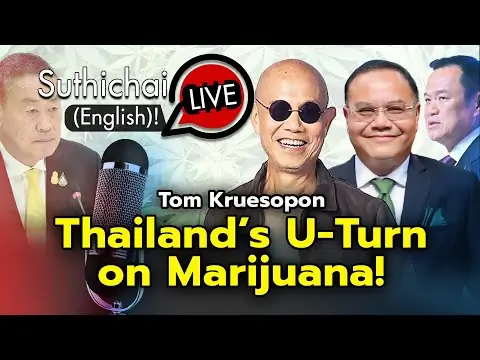Last updated on August 28th, 2024 at 07:40 am
Tom Kruesopon and Suthichai discuss Thailand’s u-turn on cannabis legalization.
Here’s a summary of the discussion from “Thailand’s U-Turn on Marijuana! Suthichai live 20-5-2567”:
- Policy U-Turn and Political Motives (00:00 – 05:09): The Thai government, which initially decriminalized marijuana, is now reconsidering criminalizing the cannabis flower due to its THC content. The reversal is politically motivated to suppress opposition parties and their supporters.
- Economic and Health Impact (05:56 – 09:53): Cannabis legalization has greatly benefited Thailand economically, becoming a billion-dollar industry and helping many with health conditions. Criminalizing it could push it back underground, harming patients and small businesses.
- Need for Regulation, Not Criminalization (09:14 – 12:22): The discussion emphasizes the need for proper laws to regulate cannabis rather than making it illegal again. Regulations should control usage, grow quality, and ensure it’s only used by those with medical needs.
- Global Perspective and Local Implications (03:09 – 06:32): While many countries like Germany, the U.S., and Japan are decriminalizing cannabis, Thailand’s potential U-turn could harm its international image and deter investments due to policy instability.
- Public Reaction and Future Steps (15:48 – 20:36): There is public unrest and protests against the re-criminalization. The new Health Minister is considering all sides, and ongoing discussions are aimed at balancing regulation with public health and economic benefits.
- Challenges of Policy Reversal (20:36 – 21:57): The policy reversal is seen as damaging to Thailand’s economy, with the immediate closure of cannabis businesses and the potential loss of billions of baht. The biggest losers would be patients who need cannabis for medical reasons, as they would be forced to turn to illegal markets.
- Corruption and Misuse Concerns (21:57 – 25:14): Recriminalization could lead to increased corruption, with police exploiting the legal gray areas for bribes. The discussion highlights that criminalizing cannabis does not address misuse; instead, it drives it underground, increasing societal strain.
- Conflicts of Interest and Industry Pushback (12:59 – 13:47): Major industries, including alcohol, tobacco, and pharmaceuticals, are opposed to cannabis legalization due to its impact on their sales. There is also concern that personal biases within political parties are influencing the push to recriminalize cannabis.
- Public Perception and Political Calculations (27:50 – 32:26): The uncertainty around cannabis laws has created instability for businesses and potential investors. The discussion emphasizes that policy decisions driven by political motives rather than evidence-based assessments can undermine public confidence and economic stability.
- Call for Practical Solutions (32:26 – 41:56): The conversation concludes with a call for practical regulation of cannabis, focusing on legalizing it properly with appropriate controls rather than backtracking on progress. The speakers express hope for continued dialogue and realistic policies that consider both public health and economic growth.
